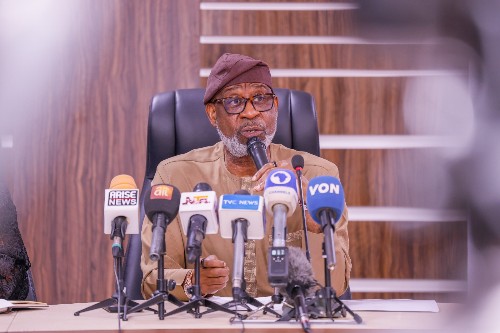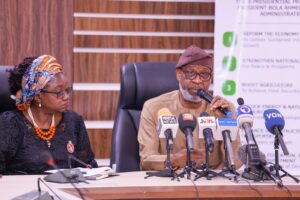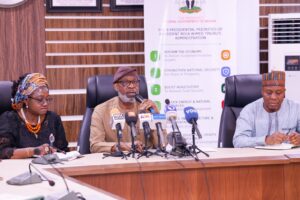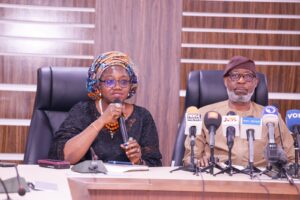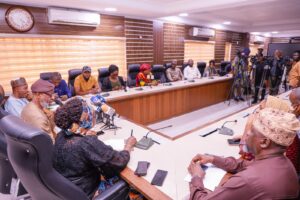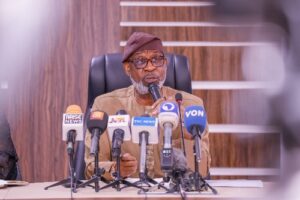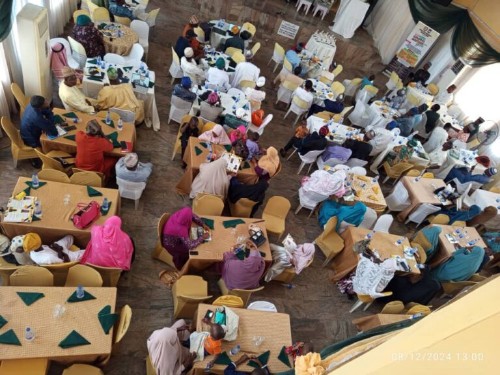— Gboyega Akosile
Proverbs 22:29 states “Seest thou a man diligent in his business? He shall stand before kings; he shall not stand before mean men.” This biblical verse is the true reflection of Governor Babajide Sanwo-Olu of Lagos State, who clocks 55 today. Without any iota of doubt, the 55th birthday of Governor Sanwo-Olu is worth celebrating considering how he has made meaningful impacts in private and public sectors, especially in the last one year of his administration as the number one citizen in the Centre of Excellence.
Mr. Governor believes that an occasion of one’s birthday, especially a milestone such as the age of 55, should be a day to reflect on one’s purpose of existence in life and, according to him, is “to serve the humanity”. Therefore the governor in his charismatic leadership and passion for the vulnerable people decided not to have an elaborate feast for families, friends, political associates, and professional colleagues. Rather he has chosen the path of honour and genuine love for the needy in the society by asking people to channel the resources they intend to use for congratulatory advertisements in celebration of his birthday to taking care of the vulnerable people in the society. The governor, based on his passion for the state has also declared his intention to spend the better part of today to attend to many important State matters.
Sanwo-Olu’s gesture is going to bring relief to thousands of Lagosians, especially the vulnerable, whose lives are expected to be touched directly or indirectly by the millions of naira that could have been used for birthday messages for the governor. Sanwo-Olu’s decision is a reflection of his conviction that “the best birthday gift anyone would give him at this period is to identify those at the bottom of the pyramid wherever they reside, lift them up by putting smiles on their faces that way, they would have lifted his heart too.”
As a man who believes in putting smiles on the faces of others; someone who is passionate and empathetic towards people around him, the governor’s decision to have a low key celebration on his major milestone deserves a lot of accolades.
Lagos State is the commercial capital of Nigeria and Africa’s fifth-largest economy and based on its unique position as having the highest population density in Nigeria, the battle for the state usually dominates the country’s politics during the election period. This is why many political parties usually battle to be in control of the state. But despite several attempts by the opposition political parties, the progressive camp, which Sanwo-Olu belongs to, has been in charge of the State since the return of Nigeria to a democratic path on May 29, 1999.
The ruling party has provided good governance in Lagos State in the last 21 years and Governor Sanwo-Olu has been part of the State’s progressive trajectory in the past seventeen years. He was a member of the cabinet of the three previous governors. The banker, who turned politician began his political journey at 37 when he served as Special Adviser on Corporate Matters to the ex-deputy governor, Otunba Femi Pedro, and later Special Adviser to Governor Bola Tinubu on Corporate Matters in 2004. He was head of different ministries between 2004 and 2015 as Honourable Commissioner. Former Governor Tinubu appointed Sanwo-Olu as acting Commissioner for Economic Planning and Budget from 2004 to 2005 and later made him substantive Commissioner for Commerce and Industry in 2007. Also, former Governor Babatunde Fashola in 2007 appointed him as Commissioner of Establishment, Training, and Pensions. The incumbent governor also served as the Managing Director/CEO of the Lagos State Development and Property Corporation (LSDPC) under the immediate past governor, Mr. Akinwunmi Ambode.
His emergence as the governor of Lagos State was historic, considering the support that heralded his emergence as the standard-bearer of the All Progressives Congress (APC) during the party’s gubernatorial primaries. For the first time in Lagos politics, Sanwo-Olu defeated an incumbent governor to pick his party’s ticket. He won the March 2, 2019 governorship poll landslide, defeating 44 candidates other who contested against him.
As a man who has played an active role in the growth and development of the State in line with the ‘Lagos Master plan’, Sanwo-Olu didn’t disappoint Lagosians immediately he took over the mantle of leadership. Knowing the various challenges facing the state, Sanwo-Olu’s administration, working with a six pillars policy programme tagged T.H.E.M.E.S to deliver good governance to millions of Lagosians swung into action. T.H.E.M.E.S stands for; Traffic Management and Transportation; Health and Environment; Education and Technology; Making Lagos a 21st Century economy; Entertainment and Tourism; Security and Governance.
It is worthy of note that when Sanwo-Olu emerged as an APC governorship candidate, Lagos had literally become a dumpsite as heaps of municipal waste littered the streets. The state agency set up for waste disposal had been disengaged in a curious and controversial circumstance, leaving residents to resort to indiscriminate dumping of refuse, which became a daily eyesore, even to the government of the day. Apart from the issue of waste, there were several other issues of concern that the government faced when assumed office. The issues of heavy traffic, bad roads, and blockage of drainage, among others were monstrous in nature.
Governor Sanwo-Olu believes that government is a continuum and that was why he didn’t spend energy in his early days in office blaming the previous administration. Rather than giving excuses, Sanwo-Olu hit the ground running from his day one in office. He took a lot of bold steps in the early few weeks. To him, the task of achieving the ‘Greater Lagos’ he promised Lagosians must be accomplished.
Sanwo-Olu, within a week in office announced members of his kitchen cabinet as well as key appointments in the state to set the ball of governance rolling in the Centre of Excellence.
The governor also signed the Lagos State 2019 Appropriation Bill of N873,532,460,725 into law. As promised during the electioneering, Sanwo-Olu constituted his full cabinet within his first 60 days in office.
With the cabinet fully in place, the government swung into action by working hard to ensure that the people of Lagos State start enjoying dividends of democracy. The first 100 days in office was a huge success story for young several programmes and projects executed by the administration as there were several projects displayed in the scorecard.
Within his first 100 days in office, the issues of bad roads were aggressively addressed to ease movement across the State. For the government to achieve this, eight multi-national construction firms mobilized were ordered to carry out massive repair works on critical highways across the State. In addition to the efforts of the eight multi-national companies, extensive palliative and maintenance works were also carried out by Lagos State Public Works Corporation in different parts of the State. The State government also engaged the Public Infrastructure Improvement Partnership arrangement to ease traffic considerably in some parts of the State.
One of the important steps taken by the Lagos State government within the first 100days was the resuscitation of Adiyan waterworks, Phase Two, which has a production capacity of 70 million gallons per day. The government commenced the rehabilitation of the dam to increase the provision of safe drinking water to more than five million Lagos residents and to address the challenges of water-borne diseases.
The state government also put many measures in place to address waste management and environmental issues, among which are the acquisition of 10 new boats by the Lagos Waste Management Authority (LAWMA) to boost its marine waste operations in the state.
The Lagos Blue Box initiative was launched on September 5, 2019, in Community Recycling Centres across five councils with recyclers strategically positioned to help drive the process.
May 29, 2020, marked Sanwo-Olu administration’s one year and a critical look showed that he has delivered on a lot of his electoral promises. This is evident in the remarkable list of achievements he read out on June 12 during his Democracy Day broadcast titled “Great Leap towards a Greater Lagos” in commemoration of his administration’s first year in office.
Among the remarkable achievements of the Babajide Sanwo-Olu’s administration are; development of a reliable intermodal system of transportation, with investment in waterways and a light rail system; rehabilitation of roads; putting a plan in place to construct the 4th Mainland Bridge; two Mother and Child Centers (MCCs) at Eti-Osa and Igando respectively; free medical interventions in conjunction with BOSKOH Health Mission International and the Benjamin Olowojebutu Foundation to over 250,000 Lagosians across several locations in the State, huge investment in education and technology; construction of 13, 18 or 20 classroom blocks in some schools in Egbe, Ikorodu, Bariga, Shomolu, Ifako-Ijaiye and Epe areas of the state; signing of $629 million financing facility aimed at completing the Lekki Deep Seaport project and significant progress in the area of housing through four major housing projects that are ready for commissioning, among other laudable projects.
Governor Sanwo-Olu has also displayed uncommon leadership in African, putting Lagos on the global map as a very resilient state in the ongoing COVID-19 pandemic. Since Lagos became the epicenter of the pandemic in Nigeria in February 27, the governor has been up to the task as Incident Commander in ensuring that the pandemic is well managed in the State. This feat has earned Mr. Governor local and international recognition.
So far, Governor Sanwo-Olu’s action, which is largely putting a personal touch to governance has set the state is on the right path to Greater Lagos.
As he celebrates a major, I wish him the fulfillment of his heart’s desires for the good people of Lagos.
Happy Birthday, Mr. Governor!
Akosile is the Chief Secretary to Governor Babajide Sanwo-Olu

 BIG STORY5 days ago
BIG STORY5 days ago
 BIG STORY3 days ago
BIG STORY3 days ago
 BIG STORY3 days ago
BIG STORY3 days ago
 BIG STORY5 days ago
BIG STORY5 days ago
 BIG STORY5 days ago
BIG STORY5 days ago
 BIG STORY4 days ago
BIG STORY4 days ago
 BIG STORY4 days ago
BIG STORY4 days ago
 BIG STORY3 days ago
BIG STORY3 days ago



















